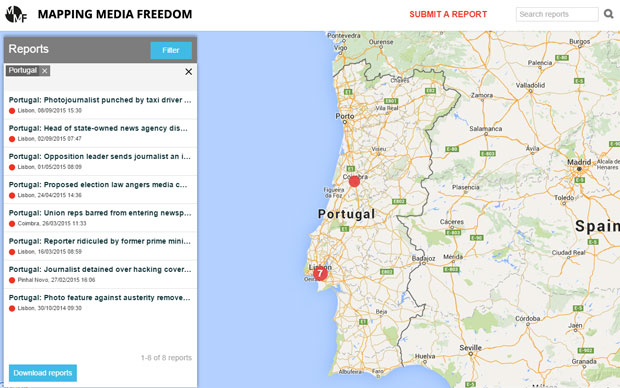Portugal: Waves of layoffs hollow out press

If there was any room left for doubt, the closing months of 2015 were enough to prove that Portuguese journalism is facing a serious challenge from which it probably won’t emerge the same. From October to December 2015, four media groups announced that they preparing to lay off workers, including journalists.
These recent cuts are a continuation of the long-term trend: between 2007 and 2014, more than 1,200 journalists — about 20 per cent of the total number of media professionals — have lost their jobs in Portugal, according to a study by Observatório da Comunicação.
The latest round of attrition began in November 2015 when the largest Portuguese media conglomerate Impresa announced it would terminate the contracts of 60 people, 20 of whom worked for the television channel SIC.
In December, the management of Público, a newspaper, announced that, due to a predicted €3 million in losses for the year of 2015, it was launching a voluntary redundancy programme for journalists and other professionals. The announcement came with a deadline: 6 January would be the last day for workers to reach a settlement with the managers. Index on Censorship has learned from an employee at the paper that 24 people have reached a deal and are set to leave the newspaper.
Despite the voluntary redundancies and cuts that included the folding of 2, the newspaper’s Sunday magazine, the company said that more layoffs may be required to reach its cost reduction targets. Público’s management has not yet to announced if more staff cuts will be made.
Público is owned by SonaeCom, a branch of Sonae, one of the biggest companies in Portugal. In 2014, Sonae had a turnover of €4.9 billion.
Within days, Diário Económico, Portugal’s leading business newspaper, revealed that due to a €30 million debt, fiscal authorities appropriated the title’s revenues until it solved its financial problems. In a statement to the newspaper Expresso, the editor-in-chief of Diário Económico, Raúl Vaz, admitted that the “situation has become much worse and more complicated, not to say dramatic”. The 26-year-old title may be forced to close, leaving 160 unemployed.
The most unusual of all dismissals happened at the Newshold media group, owned by Angolan banker and businessman Álvaro Sobrinho. On 30 November, employees at the Newshold newspapers Sol and i were told that the company was going to withdraw its investment in the two titles after claiming losses of €4.4 million and €3.8 million, respectively. The papers wouldn’t be folded under the Newshold plan, which would transfer them to a new management entity but axe two-thirds of the staff.
In the Newshold case, Mário Ramires, then CEO of the company, called a newsroom meeting at which he requested that employees staying with the papers sign new contracts that included smaller salaries. Crucially the new contracts would offer less legal compensation in the event of another round of layoffs, according to the recording of the meeting.
Ramires then asked the nearly 120 people who were losing their jobs to give up legal compensation that the company is obliged to pay under Portuguese law. He told the departing staffers that if they didn’t accept this, they would be putting the future of the papers and their colleagues’ jobs in jeopardy.
“All companies die today, they’ve been broke a long time ago. Nobody is entitled to anything because the companies have no money,” Ramires is reported to have said to his employees. “Whoever feels like crying, complaining that this is too tough and stuff like that, it’s best for them go home this second.”
The two-hour meeting was filmed with the consent of the employees. Two days later, following a visit by representatives of the Journalists Union to the news offices of i and Sol, Ramires ordered the audio of the meeting to be published on the websites of both titles. In it, Ramires, who is now editor-in-chief of the two newspapers, mentioned his wife and two sons, who he brought to the meeting. “I’m not giving up, and even if everybody jumps boat I will not give up,” he said. “And that’s why I brought my children here.”
The Journalists Union issued a statement appealing to all the Newshold journalist to “not sign, for the time being, any documents” presented to them. However, as one employee involved in the process who asked to not be named told Index, all the journalists signed documents in which they absolved the company a legal requirement to open a bank account where severance payments would be set aside. Ramires said the company could not afford to open the account at the time and assured the exiting employees that they would receive their money in January 2016, which occurred for most of the journalists. Some of the former employees are involved in disputes over vacation time and have not yet settled with the company.
Ana Luísa Rodrigues is the acting president of the Portuguese Union of Journalists and a journalist for RTP, Portugal’s public television channel. In an interview with Mapping Media Freedom correspondent João de Almeida Dias, Rodrigues said she believes that the shortage of journalists working in newsrooms — a consequence of several collective layoffs that took place in the past five years — has a negative effect democracy and press freedom in the country. Another effect has been “numbing” of media workers that avoid raising questions in fear of losing their jobs.
Index: Do you feel that the quality of the journalism that is made in Portugal has decreased as a consequence of fewer people working in the media?
Rodrigues: I think it’s there for everyone to see, it’s not just us journalists who notice it. Consumers feel that too. For example, it’s now commonplace for two newspapers to have the exact same article. That often happens in Jornal de Notícias and Diário de Notícias [two newspapers owned by the Global Media group], where they publish the same content written by the same journalist. So here’s two newspapers, which are in theory made for two different audiences, publishing the same article. And this happens with topics of the utmost importance, sometimes they have the same front page headline. This is not an exception, it has become the rule. We’re now beginning to accept this as normal. But why should it be normal?
Index: Who is to blame for the layoffs?
Rodrigues: I’m not in a position to pass judgment, but it’s important to point out a few things. First, this is an administrative decision which is made by people who think that running a media business is the same as running a sausage factory. The level of social responsibility is very low. Then, this is possible because of the complacency that some editors, who think that there is no alternative. But if we think that two different newspapers can publish the exact same article except for a tiny change of words in the headline, then one day we may start thinking that journalists aren’t needed anymore. If we accept this now, then we may start accepting many other things in the near future. And that leads me to my last point, which is the journalists. Considering the lack of job security in journalism and the high unemployment figures in the media, not a lot of people can walk out the door from a newspaper where they don’t enjoy working. And this has numbed a lot of media workers. The things that outraged us 20 years, 10 years, five years ago, seem normal to us, now.
Index: You often say that the less employed journalists there are, the more endangered democracy is. How so?
Rodrigues: If we have fewer people in our newsrooms, then we have fewer people to cover many topics that are important to our society. And those who still are in the newsrooms don’t have much time to do their job, because while there are fewer people in newsrooms, there is more work to do compare to a few years ago when there wasn’t cable television news channels or the internet. A journalist needs time to investigate phenomena and subjects that are surreptitious. So this leads to the impoverishment of a fundamental tool for the rule of law. Newsrooms have fewer eyes, fewer hands and less thinking heads which can reflect on our times.
Index: Do you believe that the state of affairs in media businesses also affects press freedom?
Rodrigues: Yes, in the sense that the work of journalists has a smaller margin. We are just like everybody else, we have bills to pay and children to raise. And when you live in an environment where there are mass layoffs or where journalists are compelled into leaving their jobs through contractual agreements, it’s obvious that the exercise of the amount of freedom every media worker must have can be compromised. I can tell you that the current environment does not favour press freedom. It takes us to situations where journalists apply self-censorship in a way that they don’t go as far as they should to contest editorial options made by those above them. Apart from that, the pressure to publish something or to do otherwise is not a new thing. But what we have now is an environment which can augment that.
Index: Both Sábado and Correio da Manhã, owned by the Cofina media group, received a legal injunction that prohibits them from writing about the judicial case of José Sócrates, a former prime minister who’s now a suspect of tax evasion, money laundering and corruption. Do you think that was a fair decision?
Rodrigues: The Union of Journalists have already stated that cutting an article short before it’s even written or published is an attack on press freedom that should be fought against and denounced. This prohibition by default makes absolutely no sense. But having said that, the act of a journalist becoming an assistant to a case with the sole purpose of writing about is something that doesn’t dignify journalism. But it’s still very clear that there is still no reason for a court to prohibit the press from publishing something that hasn’t even seen the light of day yet.
Index: Does the ownership of Portuguese media titles by Angolan investors worry you?
Rodrigues: It’s worrisome in many ways. It’s clear that there’s a certain mentality that makes no differentiation between running a media company, which means you have a higher degree of social responsibility to fulfil, and any other type of company. That’s a problem. Another problem is when one invests in a newspaper and at the same time behaves in a manner that is not friendly to the values of freedom. But I have to stress that this is not exclusive to those cases [of Angolan investors]. It’s important to understand that the concentration of media ownership is a worrisome reality which has been growing lately.
Index: Do you think it’s time for the government to begin a state subsidy that goes into financing newspapers, news channels or news radio stations?
Rodrigues: I think this shouldn’t be a taboo. It should be put on the table alongside other options. What I can tell you is that RTP and RDP (public television and radio) are financed with public money and I don’t think that anyone can honestly say that they’re more favourable to the government than the other media outlets. Besides, if you watch a Portuguese movie or go to the theatre, those productions will most likely have public funds, and that doesn’t mean that they’re acting nice towards the government. The ghost of the government’s involvement in journalism is something that should be discussed. We have to be honest about it. Why should we regard private investment as bona fide and think otherwise when it comes to public funding. This is something that we have to talk about. We can’t afford not to do that.
This article was originally posted at Index on Censorship

